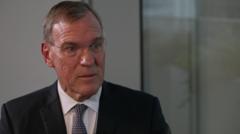Goldman Sachs has announced the termination of its diversity requirement for client boards, which mandated the inclusion of women and diverse members prior to IPOs, deeming it no longer necessary. Richard Gnodde, the bank's international CEO, stated that the policy has served its purpose and that businesses have made strides in embracing diversity. The move comes against a backdrop of shifting corporate attitudes and responses to recent legal developments regarding board diversification laws.
**Goldman Sachs Ends Diversity Policy: A Reflection on Changes and Future Directions**

**Goldman Sachs Ends Diversity Policy: A Reflection on Changes and Future Directions**
Goldman Sachs retracts its internal diversity rule aimed at enhancing board representation, citing fulfilled objectives amid evolving corporate standards.
Goldman Sachs, a prominent investment bank, has made the notable decision to revoke its internal diversity policy that required companies seeking to go public to have a minimum of two diverse board members, including one woman. Richard Gnodde, CEO of Goldman Sachs International, remarked that the initiative, established in 2020, achieved its purpose in fostering a shift toward greater inclusivity within corporate governance.
During an interview, Gnodde articulated his belief that diversity of thought is now more prevalent in boardrooms. He stated, "That policy was put in place to drive a change in behavior, and I think that’s happened." This assertion follows a December ruling in which a U.S. federal appeals court determined that the Nasdaq stock exchange could not enforce diversity requirements for boards.
The company's spokesperson confirmed that the decision to discontinue the policy was prompted by the legal landscape concerning board diversity mandates. This development mirrors a broader trend where firms such as Google and Meta have also scaled back on diversity hiring initiatives, influenced by changes in political leadership, notably during Donald Trump's presidency.
Addressing the broader economic implications, Gnodde expressed concern about the current political climate affecting corporate investment. He acknowledged that uncertainty around policy outcomes, notably concerning trade tariffs under Trump, is dampening businesses' willingness to invest.
Meanwhile, shifting focus to the UK, Gnodde urged the government to expedite infrastructure projects to bolster economic growth. He emphasized that while future projects are important, immediate actions should be taken to stimulate the economy. His comments come as the UK grapples with slow growth, underscoring the urgency for infrastructure investments.
Goldman Sachs recently highlighted in a report that fostering growth remains a significant challenge for the UK, emphasizing the need for inclusive competition and consolidation in the business sector to enhance global competitiveness. Gnodde’s observations on corporate strategies and government actions reveal a pivotal moment in the dialogue surrounding diversity, economic growth, and the evolving responsibilities of corporations in a changing political landscape.



















